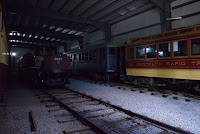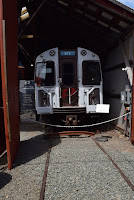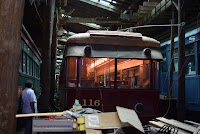Frank writes...
The day after my visit to Seashore, I had the opportunity to drive down to East Haven, Connecticut and visit Branford (aka the Shore Line Trolley Museum). Branford is another one of the early eastern trolley museums and was founded in the late 1940s, when it assumed operation of a short stretch of a Connecticut Company suburban line.
The museum's location is, objectively speaking, awful - they're located adjacent to a salt marsh, on a narrow sliver of land about one foot above the water table. But they've made the best of it and have amassed a large collection of electric railway equipment (third largest collection in the nation behind Seashore and IRM). They recently completed construction of two brand new car barns - sound familiar? - which are located on high ground, several feet above the rest of the museum's barns, on a small rocky hill. This is good because in the last five years they've been badly flooded twice, first by Hurricane Irene and then by Hurricane Sandy. Brackish water flooded many cars to the depth of a foot or two and at one point they were down to only three operating cars. But with a lot of determination, donations, and FEMA money, they're in the middle of a truly impressive motor rebuilding campaign that has returned perhaps a dozen cars to service with many more on the way.
So stupid me, I neglected to get an overall photo of the two new barns. They're impressive looking, with steel framing and insulated skins similar to Arden's big display building. I did get some interior shots though, thanks to a tour from Jeff Hakner. Jeff is one of the higher-ups at Branford and is also the webmaster for the PNAERC site. Above, inside the west (shop) building, a couple of non-operational streetcars: a Montreal wood car and the only complete PSNJ car in existence. If you look closely at the barn posts right over the roof of the PSNJ car, you can see doublers in place so that a traveling crane can be fitted in the future.
And this is what the crane will be traveling over: a 100' long inspection pit in the shop building. Pretty nice! The pit track isn't in place yet but the other barn tracks are. The foreground track is intended for truck work and maybe short-term projects; right now Connecticut Company business car 500, the pride of the Branford fleet, is at the back of the barn. (Side note: at IRM car numbers are normally prefaced by "the" - "the 309" or "the 749." This is not the case at Branford except, Jeff told me, in the case of this car, which is known as "the 500.")
And here's a shot taken inside the other barn, which will be a display building. Right now this car houses most of the equipment that has had its motors rebuilt, since FEMA has made it clear that they don't want any of this flood repair work undone by motors getting flooded again. The barns don't have overhead wires to them yet but cars can be brought in and out using stingers. This is a crummy photo but it shows an open-cab derrick from the South Brooklyn, a "Low-V" subway car from New York, and a neat turn-of-the-century streetcar from Brooklyn.
And here's one of Branford's most recent acquisitions - but by far its oldest. This is arguably the world's oldest horsecar, dating to around 1856. The driver sits on the roof, stagecoach-style, and the entire body pivots atop the chassis so that the car can be turned around without need for a wye or turntable. It was preserved as a historic relic by the 1890s and spent decades in the City Museum of New York. In recent years it was stored in a warehouse, but the museum lost their lease and gave the car to Branford. It's an incredible time capsule - that paint dates back at least 120 years and maybe more like 140.
Then we walked down the hill to the main group of barns, and saw some of the other exhibits. A second recent acquisition - a much newer one - is this PATH subway car built in the 1970s. It has a grim history; it was part of the train that was abandoned at the World Trade Center station on 9/11 and months later was exhumed, cleaned up, and put into storage. Branford was given the car last year and it's been put on display.
On a less somber note, this attractive railway post office car from the New Bedford, MA street railway system was recently restored by Branford volunteers. What a neat car!
The car is nicely set up for display, with a piece of glass across the open baggage door and some crates and other articles inside.
Then we looked at a couple of ongoing restoration projects. This is another horsecar, built in 1893 by Stephenson (very late for a horsecar), retired in 1917 and acquired by Branford in the 1950s as a body. It's being totally rebuilt with new posts, side panels, platforms and interior. It's from the Metropolitan Railway in Manhattan; due to that borough's ordinance prohibiting overhead wires, several lightly-used horsecar lines lasted well into the 1900s because traffic levels didn't justify the tremendous expense of installing electric conduit. Between this and the 1850s car shown earlier, Branford has one of the earliest and one of the latest horsecars in preservation.
And here's something neat - one of four preserved Cincinnati & Lake Erie high-speed cars, which were similar to the Indiana Railroad's high-speeds. This car, 116, was recently repainted and is seeing interior restoration work.
Here Joe Kavanagh shows off the work that's been done inside the car. Note the nice new paint and pin-striped ceiling panels! The car still has the bus seats installed by CRANDIC but the museum hopes to replace these with semi-bucket seats, like what the 65 has, someday in the future.
Another current project is a PSNJ streetcar trailer which is being rebuilt by Ted Eikmann. This is an interior view; the exterior needs work but has been nicely painted. Complete (or nearly complete) streetcar trailers are extremely rare; IRM's car 9020 is in better shape than most. This car was acquired just a few years ago as a car body.
Say, that looks familiar. What else would you expect from the home of the Wall-mart streetcar exchange network? Incidentally, this shows exactly how close Branford is to the marsh - in some places about three feet off the ties!
And finally, before I left town, Jeff let me tag along on a visit to the motor shop where Branford is sending hurricane-damaged traction motors to get rebuilt. I think they had two cars' worth at the shop when we were there. It was an impressive operation! Here Jeff (right) takes a look at a couple of rebuilt motor cases, sans armatures, with one of the shop workers.














Frank,
ReplyDeleteIf you go to the Cover the Cars part of the Shoreline web site; there are a couple of hundred pictures of building the two FEMA barns. From blasting the granite ledge to putting in the first streetcars. They are quite a project!
A group of volunteers from IRM went East to help the Seashore Trolley Museum built the complex of tracks and switches out in front of the barns.
Frank,
ReplyDeleteI like your trip reports to streetcar and railroad museums. how else can I see an 1856
horse car that lives in Connecticut?
Ted Miles, who want to travel more!